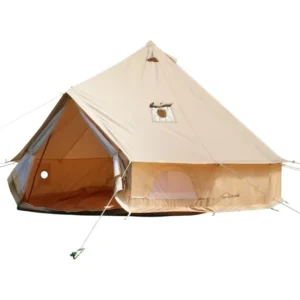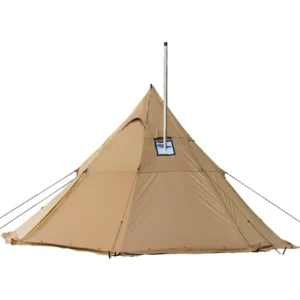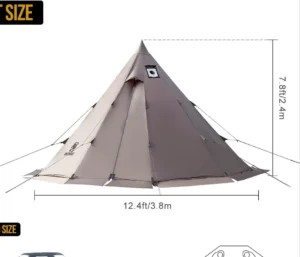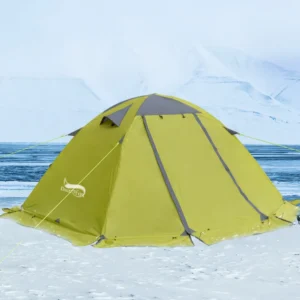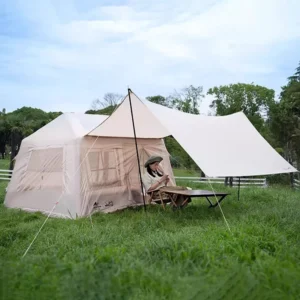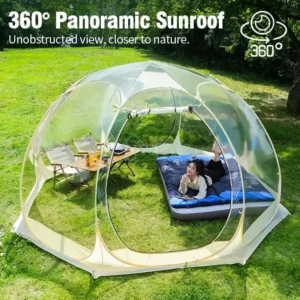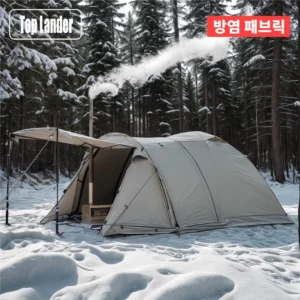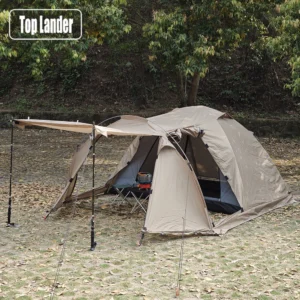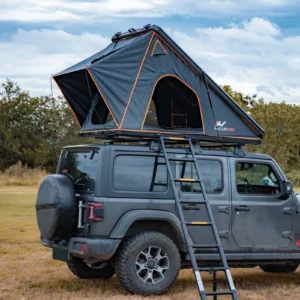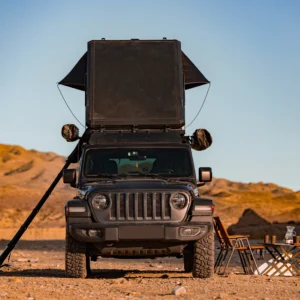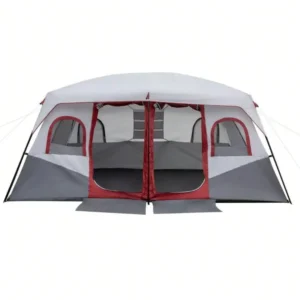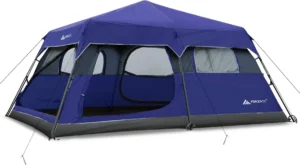Winter Camping Tent
Conquer cold, snowy conditions safely and with confidence. Our specialized winter camping tents provide sturdy shelter against harsh elements, keeping you warm throughout your four-season adventures.

Showing 1–12 of 41 results
Canvas Camping Tent, Heavy Duty 4 Season Tent, Winter Camping Tent
$1,220.06 Select options This product has multiple variants. The options may be chosen on the product pageHeavy Duty 4 Season Tent, Winter Camping Tent
$638.69 Select options This product has multiple variants. The options may be chosen on the product pageHeavy Duty 4 Season Tent, Mountaineering Tent, Winter Camping Tent
$821.95 Select options This product has multiple variants. The options may be chosen on the product pageHeavy Duty 4 Season Tent, Trekking Pole Backpacking Tent, Winter Camping Tent
Price range: $424.76 through $440.41 Select options This product has multiple variants. The options may be chosen on the product pageEasy Setup Camping Tent, Instant Camping Tent, Waterproof Pop Up Tent, Winter Camping Tent
$792.34 Select options This product has multiple variants. The options may be chosen on the product pageHeavy Duty 4 Season Tent, Mountaineering Tent, Winter Camping Tent
$870.40 Select options This product has multiple variants. The options may be chosen on the product pageDome Camping Tent, Heavy Duty 4 Season Tent, Winter Camping Tent
Price range: $568.41 through $677.18 Select options This product has multiple variants. The options may be chosen on the product pageDome Camping Tent, Heavy Duty 4 Season Tent, Waterproof Camping Tent, Winter Camping Tent
Price range: $618.15 through $618.73 Select options This product has multiple variants. The options may be chosen on the product pageDome Camping Tent, Heavy Duty 4 Season Tent, Winter Camping Tent
Price range: $600.07 through $619.92 Select options This product has multiple variants. The options may be chosen on the product pageHeavy Duty 4 Season Tent, Ultralight Freestanding Tent, Winter Camping Tent
$3,722.66 Select options This product has multiple variants. The options may be chosen on the product pageHeavy Duty 4 Season Tent, Waterproof Camping Tent, Winter Camping Tent
$3,876.14 Select options This product has multiple variants. The options may be chosen on the product pageHeavy Duty 4 Season Tent, Waterproof Pop Up Tent, Winter Camping Tent
$3,772.78 Select options This product has multiple variants. The options may be chosen on the product page
Showing 1–12 of 41 results
Winter’s Ultimate Shelter: Selecting Your Perfect Winter Camping Tent
Winter camping presents unique challenges that demand specialized equipment. When temperatures plummet and snow begins to fall, your tent becomes more than just a sleeping space—it’s your lifeline against harsh elements. Winter camping tents are specifically engineered to withstand extreme conditions, from heavy snow loads and howling winds to sub-zero temperatures that would collapse or penetrate standard camping shelters.
At Explore Elements, we understand that selecting the right winter tent is crucial for both comfort and safety in cold-weather adventures. The perfect winter shelter balances robust weather protection, structural strength, and proper insulation while remaining practical for your specific needs. Throughout this guide, we’ll explore the essential features that separate true winter performers from fair-weather options, helping you make an informed decision for your next cold-weather expedition.
What Makes a Winter Camping Tent Different?
A true winter camping tent—often called a 4 Season & Winter 2 Person Tent—differs fundamentally from its 3-season counterparts in both design and materials. While 3-season tents prioritize ventilation and weight savings, winter tents are engineered specifically for structural integrity and weather resistance in extreme conditions.
Key differences include:
- Stronger frame systems with additional poles, reinforced intersections, and heavier-duty materials like premium aluminum alloys that resist snapping in freezing temperatures
- Steeper wall designs that actively shed snow rather than allowing buildup that can collapse the structure
- Heavier, more robust fabrics (often 70+ denier compared to 20-40 denier in 3-season tents) that resist tearing and abrasion from ice and rough handling with gloves
- Limited mesh panels and additional fabric coverage that retains warmth while still managing condensation through strategic ventilation
These engineering differences aren’t just about comfort—they directly impact your safety when conditions deteriorate and retreat isn’t an immediate option.
Essential Features to Consider When Choosing
When evaluating winter camping tents, certain features stand out as particularly important for cold-weather performance:
Weather Resistance & Durability
Winter tents require superior weather protection beyond what standard tents offer. Look for waterproof ratings of 1500mm hydrostatic head at minimum, with premium options offering 3000mm+ protection. The rainfly should extend close to the ground with minimal gaps where blowing snow can enter.
Material quality becomes even more critical in winter conditions. Higher denier fabrics (70D and above) provide better puncture and tear resistance when materials stiffen in cold temperatures. Reinforced stress points and stitching prevent failure points during high winds or when clearing snow from the tent exterior.
Pole structure should feature multiple intersection points and connection hubs that distribute the weight of snow loads. Premium aluminum alloys maintain strength when temperatures drop, while fiberglass poles can become brittle and dangerous in extreme cold.
Winter Tent Types for Different Adventures
Different winter activities call for specialized tent designs to match your specific needs:
Mountaineering Tents feature the strongest possible construction with dome or geodesic designs that maximize strength-to-weight ratio. These shelters prioritize stability in high winds and heavy snow, often at the expense of interior space and setup simplicity. They’re essential for high-altitude camps and exposed terrain.
Backpacking winter tents balance protection with portability, featuring streamlined designs that still offer sufficient strength for moderate winter conditions. These models focus on keeping packed weight manageable while maintaining critical winter-specific features.
Base camp/expedition models provide generous interior space for extended stays during winter adventures. With robust construction and additional vestibule space for gear storage, these larger shelters create a comfortable haven during multi-day excursions.
Hot tents incorporate stove jacks and fire-resistant materials to accommodate small wood stoves, allowing for internal heating that dramatically increases comfort in deep winter conditions. These spacious options excel for longer stays in one location.
Understanding Winter Tent Specifications
Navigating technical specifications helps you compare winter tent options effectively:
Season ratings – True “4-season” tents handle winter conditions, while “expedition” or “mountaineering” designations indicate suitability for extreme environments.
Tent geometry – “Geodesic” and “semi-geodesic” designs provide superior stability through triangulated pole structures, while “tunnel” tents offer good space-to-weight ratios but require proper orientation to winds.
Hydrostatic head – This waterproofing measurement (e.g., 2000mm) indicates how much water pressure the fabric can withstand; higher numbers mean better waterproofing.
Denier – Fabric thickness measurement where higher numbers (e.g., 70D vs 30D) indicate more durable, puncture-resistant materials suitable for harsh conditions.
Packed vs. trail weight – Packed weight includes everything in the package, while trail weight typically includes just tent body, rainfly, and poles—the minimum needed for setup.
Essential Accessories for Your Winter Tent
Enhance your winter tent’s performance with these critical accessories:
- Snow stakes – Longer, wider designs that grip effectively in snow rather than standard tent pegs
- Footprint – Additional ground protection that prevents tears and moisture penetration from rough or icy surfaces
- Condensation cloth – Absorbent fabric for wiping interior walls where moisture collects from breathing and body heat
- Repair kit – Cold-specific supplies including pole splints, repair tape that adheres in low temperatures, and extra cord
These additions address common winter camping challenges and can significantly extend your tent’s lifespan and performance.
Is a Winter Tent Worth the Investment?
Quality winter tents often come with premium price tags, but the investment provides critical value beyond basic shelter. A properly designed Heavy Duty 4 Season Tent not only offers protection when conditions deteriorate but also provides versatility across multiple seasons.
Consider that a quality winter tent typically lasts 7-10 years of regular use with proper care, spreading the investment across many adventures. More importantly, the safety margin provided during unexpected weather events—when a tent failure could lead to dangerous exposure—makes the additional cost a practical consideration rather than a luxury.
How Do Winter Tents Compare to Standard Camping Tents?
| Feature | Winter Tent | Standard Dome Camping Tent |
|---|---|---|
| Snow Load Capacity | High – engineered for accumulation | Low – may collapse under weight |
| Wind Resistance | Superior with multiple pole crossings | Moderate with simpler structures |
| Cold Weather Insulation | Minimal mesh, full coverage rainfly | Extensive mesh for ventilation |
| Condensation Management | Winter-specific venting systems | Designed primarily for warm weather |
| Weight | Heavier (6-10 lbs) | Lighter (3-5 lbs) |
| Packed Size | Larger | More compact |
| Price | Higher investment | More affordable |
This comparison illustrates why specialized equipment matters—standard tents simply aren’t designed for the structural loads and weather resistance that winter camping demands.
Can You Use a Winter Tent Year-Round?
Yes, most winter tents can be used year-round, though with some trade-offs. Their robust construction means they’ll handle any conditions you encounter, but they typically carry weight and bulk penalties compared to season-specific alternatives.
During warmer months, look for models with convertible ventilation panels that can be opened to increase airflow. Many quality winter tents feature dual-layer doors and rainfly vents that can be configured for better summer breathability. However, you’ll still be carrying extra fabric and pole weight that isn’t strictly necessary for mild conditions.
For frequent campers in variable climates, a true 4-season tent from Explore Elements offers impressive versatility, eliminating the need for multiple specialized shelters while ensuring you’re prepared for unexpected weather in any season.

